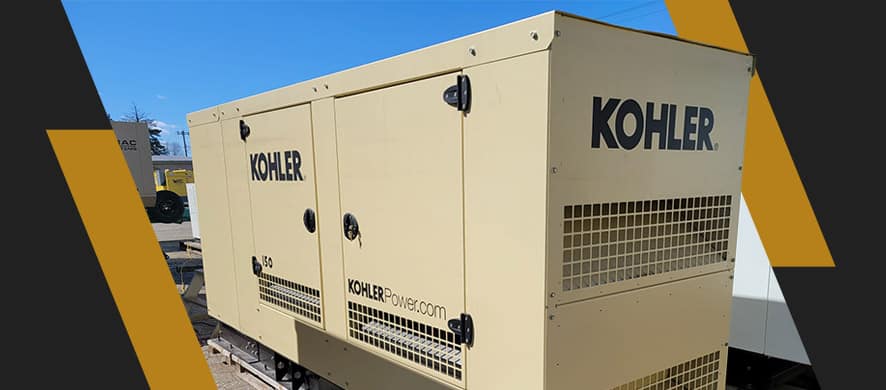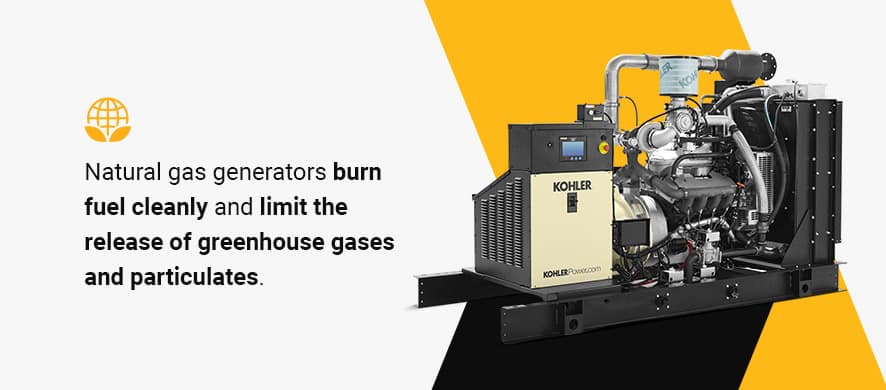Understanding Natural Gas Generator Emissions

For many industrial and commercial businesses, energy is a significant concern, especially as fuel prices fluctuate and regulations evolve. In an eco-conscious world, your choice of fuel affects everything from compliance and system uptime to safety and overall costs. If you need a generator for backup power but are looking for more emission-friendly options, consider a natural gas generator.
Although they still use fossil fuels, natural gas generators offer fewer emissions than their diesel counterparts. In fact, natural gas generators are considered one of the cleanest burning fuel types when it comes to backup generators. The natural gas pipeline transit system also removes the risk of fuel spills that wreak havoc on the environment. Natural gas generator emissions can also be a valuable part of your sustainability plan, so let’s explore how they work and how they can help.
How Natural Gas Emissions Work
Typically, the fuel-burning process — rather than the fuel itself — creates the harmful emissions we try to limit. Natural gas is a hydrocarbon mixture, primarily made of methane, but it also has small amounts of gases like hydrogen sulfide, carbon dioxide (CO2) and nitrogen.
The process starts in a pipeline or tank, which stores and transports the gas. From there, a gas generator creates power by burning the fuel. The general process is similar to that of other generators, but a natural gas generator reduces emissions at several points of power generation:
- Injection: A natural gas generator’s internal combustion engine works similarly to the one in a diesel engine, but its gaseous state allows natural gas to undergo stoichiometric combustion. This process consumes 100% of the fuel, significantly improving the generator’s power density, fuel economy and exhaust emissions.
- Ignition: Diesel fuel has low combustibility, so diesel engines must compress and heat the fuel to get it to ignite. Since natural gas is highly combustible, these engines can use less compression. They use a spark plug system like that of a gasoline engine, along with a specialized piston-head bowl for compression. Unlike a diesel engine’s fuel injector, natural gas generators use integrated fuel modules.
With fewer emissions created during combustion, natural gas generators also benefit from simpler aftertreatment systems, which remove pollutants at the exhaust. Simpler systems can help reduce maintenance demands and boost longevity while releasing fewer harmful emissions.
Natural Gas vs. Diesel Generator Emissions
Although natural gas still contains greenhouse gases, as stated earlier – it releases far less of them when burned. For every million British thermal units (MMBtu) burned, natural gas generates about 117 pounds of CO2. Coal and distillate fuel oil, however, create about 200 pounds and over 160 pounds of CO2, respectively.
Comparing natural gas vs. diesel emissions is a crucial consideration for businesses looking to stay compliant and meet sustainability initiatives. A natural gas generator’s reduced emissions can help significantly. Natural gas also tends to release less particulate matter (PM) into the atmosphere. Particulates include solid substances like unburned fuel, solids and ash.
Emission Regulations for Natural Gas Generators
Commercial and industrial generators use considerable amounts of fuel, so many jurisdictions have implemented regulations to limit harmful emissions. Since a natural gas generator’s emissions are so much lower, they often have fewer restrictions.
The Environmental Protection Agency (EPA) regulations break generators down into multiple tiers, each reflecting specific controls that manufacturers use to control emissions. These regulations are more relevant for diesel engines, but natural gas generators must also meet them, depending on their size and use case. For example, emergency generators typically have more lenient requirements since they’re only used occasionally. EPA-certified natural gas generators have been tested to meet these standards.
California air resources board (CARB) requirements
In addition to federal regulations, some states have their own requirements for generators. One notable standard comes from the California Air Resources Board (CARB). CARB has stringent requirements that may affect natural gas generators more than the EPA standards would. CARB also relaxes requirements for emergencies, including Public Safety Power Shutoffs, which often occur to help prevent wildfires.
Advantages of Natural Gas Generators
Natural gas generators have a lot to offer for businesses across industries. Some of the benefits of natural gas generators include:
Eco-Friendly Operations

Of course, a natural gas generator helps reduce emissions through the processes we’ve discussed. Many people consider natural gas generators good for the environment because they burn fuel cleanly and limit the release of greenhouse gases and particulates.
Another reason natural gas generators are more eco-friendly comes from fuel storage. Since the gas moves through pipelines, it’s readily available in many major cities and safer to transport. These qualities help limit the environmental concerns associated with storing diesel fuel, which can spill into the ecosystem.
Combined Heat and Power (CHP)
A growing trend when it comes to natural gas generators is Combined Heat and Power, or CHP for short. CHP simultaneously generates power and heat for a building or facility while running a natural gas generator. Due to their lower emissions, capability of a steady fuel supply, and preference for use in urban environments, CHP system capabilities have turned natural gas generators into an increasingly popular way to address both heat and power needs.
Reduced Noise
Natural gas generators can be much quieter than diesel generators, so they’re especially useful in reducing noise pollution. They work well in generator rooms or regions with local noise ordinances. Businesses in urban environments often benefit from this quiet operation.
Low Upfront Cost
Natural gas generators typically have a lower upfront cost, making them more attainable for businesses with limited capital.
Fuel Flexibility
Some natural gas generators can also accept propane fuel, allowing you to switch between fuel types, which is a great advantage when compared to their diesel generator counterparts that must have fuel storage containment tanks to prevent spills, and natural gas generators don’t need this structure — another perk for small spaces and urban installations.
The majority of new natural gas generators being produced today already have the equipment required to run off natural gas and propane installed in the unit, with options such as manual switches that enable users to select which fuel type they’d like to use. These flexible characteristics can be particularly helpful during emergencies, such as blizzards and hurricanes, by allowing you to use whatever fuel sources you have available.
Disadvantages of Natural Gas Generators
Despite these advantages, anyone considering a natural gas generator should understand a few challenges associated with this equipment:
Maintenance Demands
Natural gas generators typically require more maintenance than diesel generators, due to being spark-ignited. This means that the engine has spark plugs that need to be regularly checked, maintained, and serviced as needed. These demands can contribute to operating expenses and will require effective planning to avoid downtime.
Dependence on Utility Supplies
If you only get your natural gas supply from a utility provider, you won’t be able to use your generator when the provider shuts off the supply. Utility companies might shut off natural gas supplies during disasters to avoid safety issues. While many natural gas generators can be outfitted to run off of propane, propane supply/replenishing could prove challenging in situations such as natural disasters.
Safety Concerns
While natural gas generators avoid the issue of spillage, natural gas is flammable and explosive, so you must check equipment carefully to prevent hazardous leaks.
Fuel Efficiency
While natural gas generators cost less initially, businesses must also consider the efficiency of natural gas vs. diesel generators. Diesel fuel has a higher energy density, so you get more energy from the same amount of fuel. A natural gas generator’s efficiency can ultimately impact fuel costs.
Contact Woodstock Power for Comprehensive Natural Gas Generator Services
Natural gas generators are an excellent solution for reducing emissions and implementing a compliant, flexible and quiet system. Whether you need a backup gas generator or prime power, the experts at Woodstock Power can help you find and install the right equipment for your business.
We have a wide selection of thoroughly inspected, serviced and tested used natural gas generators, and we can help with maintenance. If you’re upgrading an old generator, we also buy used models in good condition. Our inventory also includes diesel generators if natural gas isn’t right for you.
Get in touch with us today to discuss natural gas generators and see if this fuel source is right for your organization.


